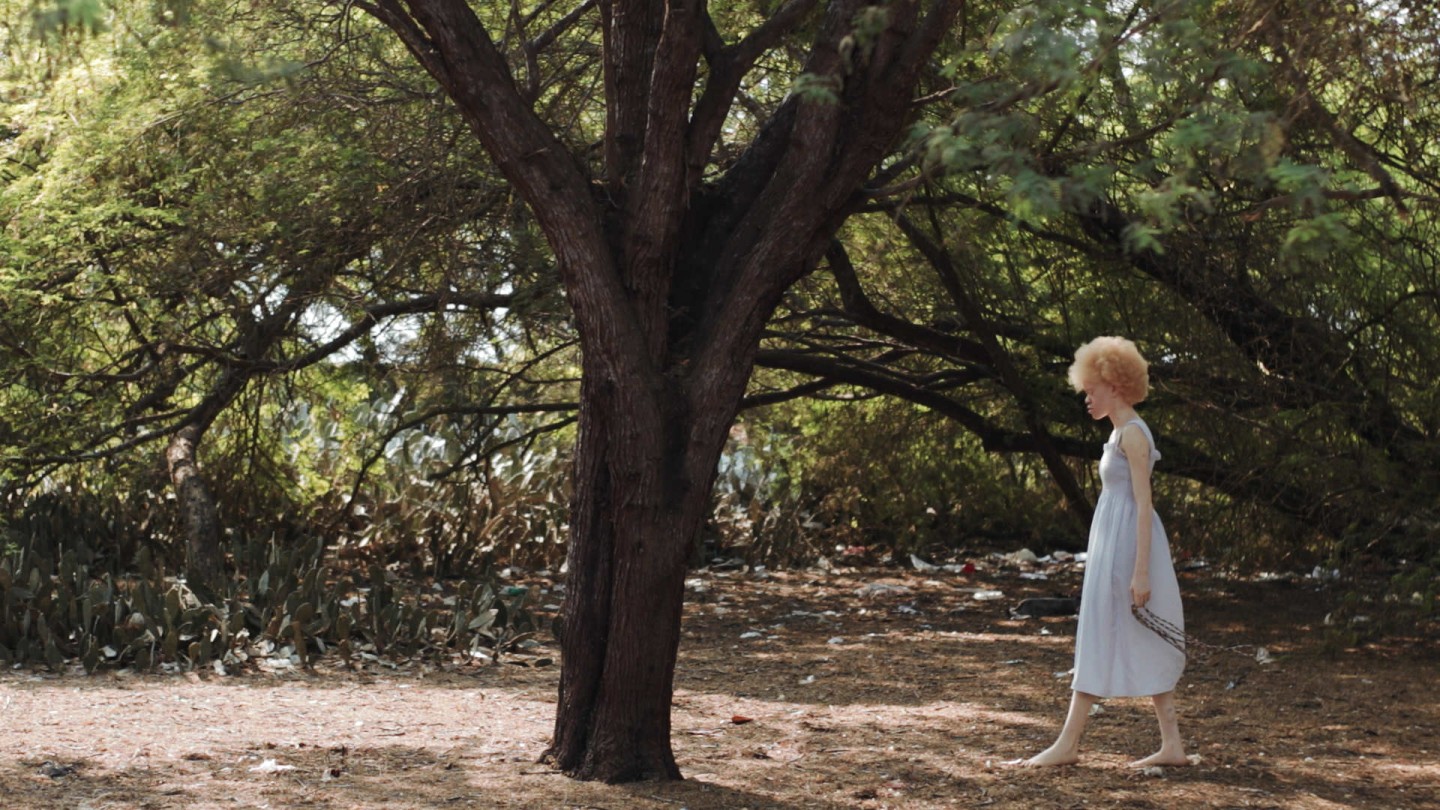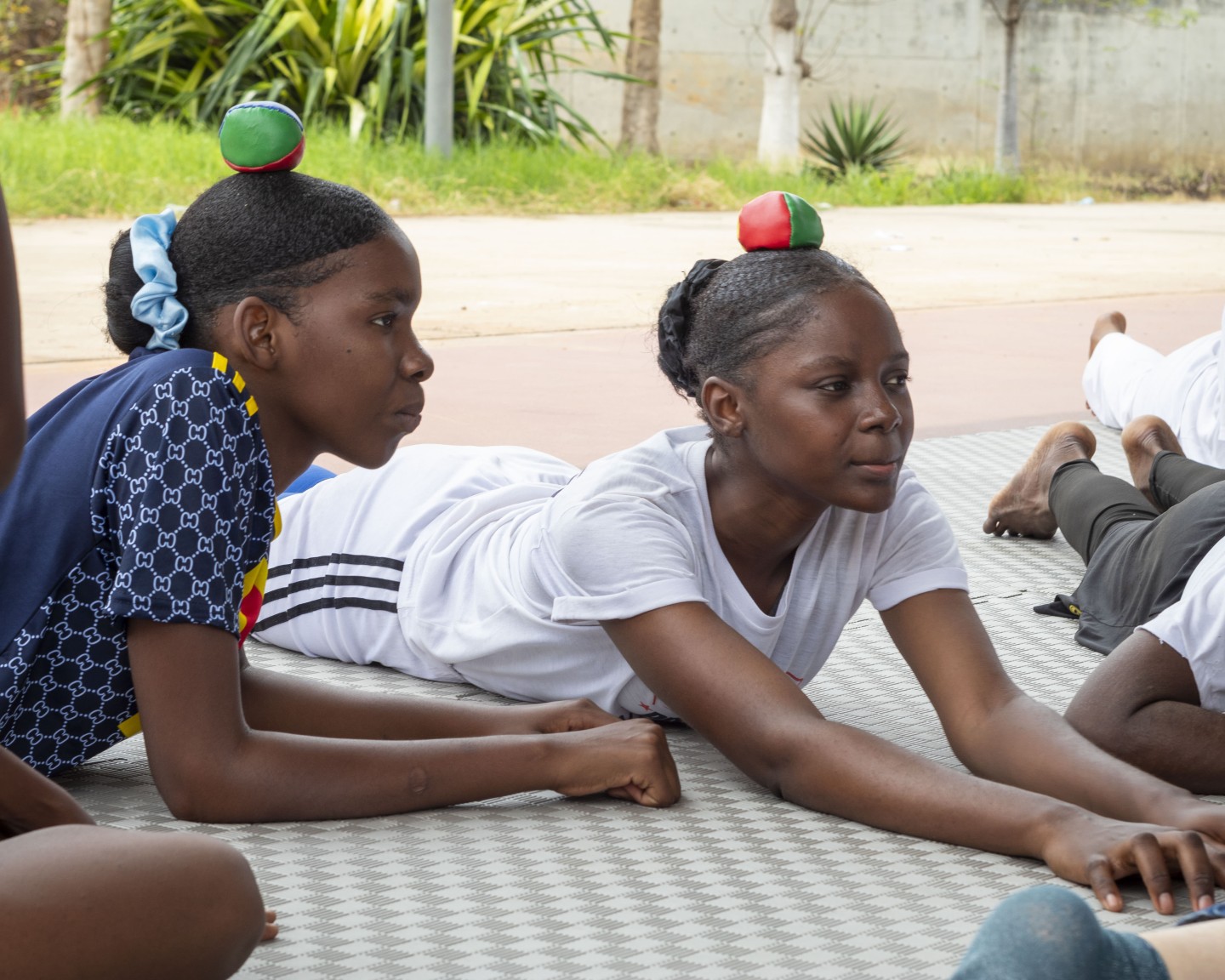Disability is rarely being addressed publicly in Angolan society. There is a certain awareness concerning people with impairments, as Angola went through 40 years of civil war, but there are still some taboos around the questions of disability as a medical condition.
Initiated by poet and rapper Isis Hembe, himself living with physical impairment, the festival No Meu Mundo (Enter My Universe) draws attention to difficulties people with disabilities face in Angola, with a special focus on accessibility to cultural life. 40 years of censorship and armed conflict have left countless mine victims across civil society and soldiers with PTSD behind. Despite that, disability and impairment are topics that are still rarely being addressed in Angola, calling for a much-needed public discourse about the matter.
The festival, first of its kind in the country, took place from 12 to 29 October 2023 and was an initiative by a group of Angola-based cultural institutions (including the newly founded association ANADA - National Association of Artists with Disabilities and Albinism), local artists and activists in cooperation with the European partners in Angola.
Creating Angola's first fully inclusive and accessible art venue
The cultural scene of Angola is, due to the Portuguese language, still quite isolated. It was therefore a novelty to engage in a European-Angolan co-productionand it was the first close collaboration between EUNIC partners based in Angola. Inclusion is a relatively new idea in Angola, specifically inclusive access to art, both on the side of artists (visibility) and of the public (access to venues). Due to the long period of censorship, there is hardly any public discussion about social problems in Angola, let alone a platform for people who are invisible and marginalised in Angolan society to talk about their challenges and problems.
To guarantee visibility, the inclusive arts festival with workshops, exhibitions, screenings and two policy roundtables brought together Angolan and European artists to co-create in townships such as the neighbourhood Cazenga and the city centre of Luanda. One of the project’s highlights was the first ever European-Angolan co-production of a hip hop opera by artists with and without disabilities. The festival aims at tearing down the borders between different universes.
I know of several projects for people living with impairments, but we have never been consulted for any of them. It is what I call ‘Damaismo’ we are good to show up for PR and taking pictures with us, but in legislation nothing changed until now.
Ana Paula Cavanha, member of LARDEF - League of Support for the Integration of the Disabled
The festival
The festival was a premiere to have artists with disabilities being seen on stage, addressing directly potential decision makers, but also expanding the theatre of the Cazenga based art centre ANIM'ART to meet the needs of persons with impairments, creating Angola's first fully inclusive and accessible art venue. Its highlight was the international co-production of a hip-hop opera including artists living with and without impairments from different fields (music, dance, theatre), which premiered on 28 October and has since seen reprisals. Refurbishing the art centre ANIM’ART created Angola’s first fully inclusive and accessible art space. Two roundtables addressed questions of living and working with impairment in Angola, raised social and political awareness and reached out to decision-makers and politicians. Thus associations lobbying for impairment received a public platform.
Furthermore, several workshops for youth with visual impairments were organised, the festival programme included three film sessions showing that actors with disabilities can be main cast and an exhibition at Camões, I.P. was composed of two parts: a curated project by artists living with impairments in Angola and a project in Portugal with visually impaired artists from Portugal, including Angolans.
The festival was an innovation in itself. There had never been a festival that mixed so many artists living with and without impairments and that thought of the public in terms of functional diversity.
Isis Hembe, initiator of the project
The festival had a huge impact as it could provide actors which are rarely seen or integrated in productions with a platform to showcase their work in an accessible art space, reaching out to an even broader public, thus inviting all members of Angolan society to explore the seemingly different universes that people living with impairments live in. The inclusive arts festival brought together local actors from various fields and thus created new partnerships in Angola, resulting in networks, which will be ready to engage in new local or international co-productions.
The artists will continue the exchange of ideas, which leaves each cultural centre with a broader view of the local art scene, thus giving access to an artist network to draw on for any new project that each partner will plan in the future. The participating artists and the main venue want to continue to address questions of inequality and inclusion through their activities. All partners agreed that access such as venue accessibility and sign language interpretation should be taken more often into consideration / worked towards for future productions; also, EUNIC partners acknowledged to pay more attention to artists living with impairments for upcoming projects. Anim'art has agreed to invite at least one production per year featuring artists living with impairments, thus providing a lasting local platform for them. All partners are looking into the option of a No Meu Mundo biennial.
An inclusive approach to programming and communication
The festival has created not just a festival programme, but a platform for a dialogue between European and local partners. Rather than the usual one-way communication caused by the historical imbalance, No Meu Mundo brought members together on an equal term that each side was encouraged to express their own ideas and give their own input. Already when preparing the project proposal, the team held two full-day workshops with all participants; the first to define the festivals format, programme, calendar, production schedule and necessities for a detailed budget, discussing offers to conduct construction work at the theatre venue ANIM’ART.
As the team learned that many partners didn’t use appropriate language concerning disability, they agreed to schedule a second workshop prepared by LARDEF and ANADA to teach the group on the use of correct language and the inclusive concept of universal design in architecture, public transport, education, etc. To deepen the understanding of the reality people with disabilities face in Angola, ANADA presented a field study of existing associations advocating for people with disabilities. The project's communication strategy was supervised by LARDEF and ANANDA to make sure that external communication was inclusive and without prejudice in order to develop an inclusive campaign so that their members felt represented.




